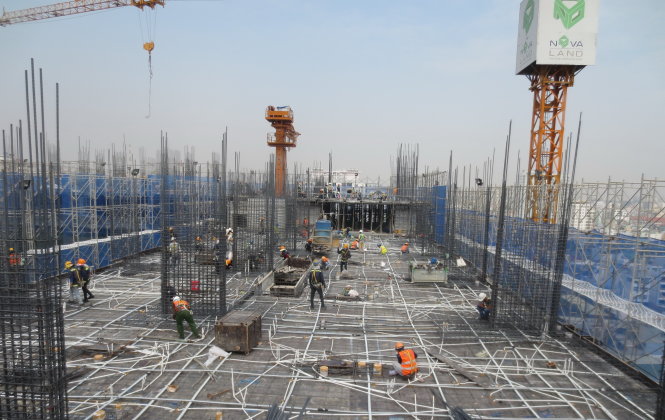Vietnam realty market shows recovery signs; insiders say no bubble will form

The construction site of a nearly-finished apartment project in District 4, Ho Chi Minh City. Photo: Tuoi Tre
The latest housing bubble occurred in Vietnam in the 2007-2008 period, when investors rushed to the realty sector after the stock market went into a crisis.
The bubble then quickly burst, leaving the market frozen with a huge number of unsold land plots, houses, and apartments.
Signs of warmth
As many as 5,150 apartments were put on sale in the first quarter of this year, three times the figure last year, according to a survey by realty consultant CBRE.
The number of new apartments in the first quarter rose 40 percent year on year, which consultancy Savills said is the strongest growth since February 2011.
Most apartment purchasers in Ho Chi Minh City in the year to date have been real homebuyers, who buy to live there, rather than speculators and secondary investors who purchase to resell, according to industry insiders.
Real estate trading floors in the city are receiving more customers than this time last year, and more purchase contracts have also been closed.
The owner of the Him Lam exchange in District 6 told Tuoi Tre (Youth) newspaper that it manages to sell around 12 apartments a week for the Him Lam Cho Lon project, located in the same district.
“Eighty apartments found buyers in April, while as many as 128 flats were sold a month earlier,” he added.
While deluxe condo projects, whose apartments cost between VND4 billion (US$186,411) and VND6 billion ($279,616) each, are not so attractive to buyers, those fetching half these prices are selling very well, a realty expert told Tuoi Tre.
Homebuyers now have a wide range of bank loan options to choose from, with banks willing to lend at reasonable interest rates ranging from only seven to eight percent.
Vietcombank, for instance, has earmarked a VND10 trillion ($466.03 million) credit package with a seven percent lending interest rate for loans with under-12-month terms.
Sacombank also offers lending for terms of up to 20 years under a credit package worth VND2 trillion ($93.21 million).
Most of the new apartment projects are located to the east of Ho Chi Minh City, where District 2 and District 9 lie.
These two districts are now home to at least 30 new apartment projects, supplying dozens of thousands of apartments.
No market bubble fear
Le Hoang Chau, chairman of the Ho Chi Minh City Real Estate Association, has ruled out the possibility of a market bubble.
“The market is only getting warm in several areas such as District 2 and District 9,” he said. “There are still many unsold apartments that need buyers.”
The chairman pointed out that there are 689 condo projects left unfinished in Ho Chi Minh City, whereas 85 others have had their construction license revoked.
Chau asserted that there will be no real estate bubble, at least in the next two years.
The chairman said the market bubble only occurs when businesses invest in segments that are not their strength while secondary investors purchase a number of apartments in the hope of making big profits when prices soar.
“Such phenomena are not happening now,” Chau said.
Deputy Minister of Construction Nguyen Tran Nam also said it is not likely for a real estate bubble to form.
“Prices are stable and there are only real homebuyers and investors, rather than speculators,” he told Tuoi Tre. “Everything is well within control.”
However, a realty expert has warned that some property companies are “employing gimmicks” to make a false impression that the market has been revitalized.
“Realty developers and real estate exchanges always have a close connection and they have many tricks to boost sales,” the expert said on condition of anonymity.
“For instance, many firms say they have successfully sold 100 or 200 apartments, but the truth is any customer who has yet to sign a contract but only makes a deposit will be counted as a buyer.”
Nguyen Hoang Minh, deputy director of the Ho Chi Minh City branch of the State Bank of Vietnam, said banks should be cautious in lending to realty developers as most of the non-performing loans are owed by businesses in this sector.
What the stars mean:
★ Poor ★ ★ Promising ★★★ Good ★★★★ Very good ★★★★★ Exceptional
Latest News
More News
- Shopee and TikTok Shop account for 8 per cent of Vietnam’s retail market (January 16, 2026 | 00:00)
- Human-centred governance seen as key to AI development (December 19, 2025 | 18:19)
- TECHFEST Vietnam 2025 links startups with policy and capital (December 15, 2025 | 18:21)
- Long Thanh International Airport welcomes first Vietnam Airlines test flight (December 15, 2025 | 18:01)
- Foreign fruits flood Vietnamese market (December 09, 2025 | 13:22)
- Vietnam’s fruit and vegetable exports reach $7.8 billion in first 11 months (December 05, 2025 | 13:50)
- Vietnam shapes next-generation carbon market (November 26, 2025 | 15:33)
- PM urges Ho Chi Minh City to innovate and remain Vietnam’s economic locomotive (November 26, 2025 | 15:29)
- Experts chart Vietnam's digital finance path: high hopes, high stakes (November 14, 2025 | 10:56)
- Vietnam’s seafood imports surge 30 per cent in first 10 months (November 10, 2025 | 19:35)
















 Mobile Version
Mobile Version